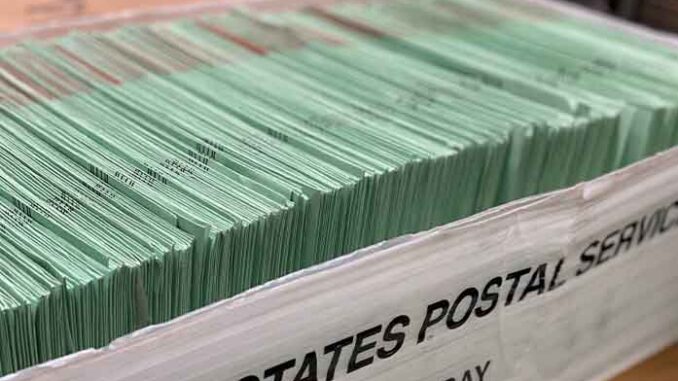
A judge denied gubernatorial challenger Kari Lake access to the 2022 ballot envelopes last week, citing privacy concerns; yet petition sheets are fully public.
Abe Hamadeh — the Republican attorney general candidate challenger, now also a congressional candidate — pointed out the contradiction in response to the ruling. Hamadeh noted that ballot envelopes afford a greater level of privacy because they don’t contain information as to whom the voter cast their ballot, unlike petition sheets which contain identifying information alongside a partisan issue.
“So… we can see and challenge petitions which include names, signatures and addresses of voters BUT we can’t see ballot envelopes that just have a name and signature… because… of voter privacy?” said Hamadeh. “A ballot envelope is separated from the actual ballot so no one will know how someone voted.”
Every election year thousands of petition sheets are tossed out due to fraudulent signatures.
So… we can see and challenge petitions which include names, signatures and addresses of voters BUT we can’t see ballot envelopes that just have a name and signature… because… of…
— Abe Hamadeh (@AbrahamHamadeh) December 3, 2023
Hamadeh cited the 2018 discovery of four campaigns caught using fraudulent signatures.
In his ruling, Judge John Hannah of the Maricopa County Superior Court argued that a voter’s name, address, and phone number were enough to elicit widespread fraud and harassment. The envelopes don’t contain the additional security information used to verify a voter’s ballot, such as the last four digits of a Social Security number or a mother’s maiden name.
“The ballot affidavit envelopes from the 2022 election include the signatures of some 1.3 million Maricopa County voters, each conveniently presented with the voter’s name, address, and telephone number on the same page,” said Hannah. “Disclosure of the ballot affidavit envelopes therefore would create a risk of widespread fraud where none exists at present.”
Hannah credited Maricopa County Recorder Stephen Richer’s testimony and expert knowledge as the basis for his ruling.
“The Court credits Mr. Richer’s testimony that disclosure of the ballot affidavit envelopes would create election integrity issues and depress voter participation,” said Hannah. “That knowledge makes Mr. Richer’s evaluation of the risks of voter information disclosure authoritative enough, and his predictions about the consequences of disclosure reliable enough, to carry substantial weight in the balancing of interests that a contested public records request like this one requires.”
Hannah also declared that Lake hadn’t presented a single case of faulty signature verification.
In his opposition to Proposition 309 last year, Richer said that ballot envelopes contain no sensitive personal identifying information apart from a signature.
Re Jeopardizes voter data privacy.
Currently, return ballots have no sensitive personal
identifiable information. Under Proposition 309, all voters will have to write their birthdate on the return ballot, and many voters will write the last four numbers of their …— Stephen Richer—MaricopaCountyRecorder (prsnl acct) (@stephen_richer) October 11, 2022
Back in March, Richer defended his office’s right to refuse Lake access to the ballot envelopes. Richer claimed their release would be illegal. Hannah agreed in last week’s ruling, though he did preface with the concession that ballot envelopes are of a restrictive type of public record.
Hi Josh!
We're not producing the ballot envelopes for the same reason this office has never produced the envelopes pursuant to a PRR:
Because it would be illegal.
State law thinks it's unwise to give out phone, address, and signature of all voters to anyone who asks. https://t.co/cJexWFwMHz
— Stephen Richer—MaricopaCountyRecorder (prsnl acct) (@stephen_richer) March 31, 2023
Lake’s campaign echoed Hamadeh’s assessment. They accused Richer of undermining elections for testifying against opening the ballot envelopes for public records.
.@Stephen_Richer has been given the legal approval to continue to undermine election integrity in Arizona.
We expect he will enthusiastically embrace it.
— Kari Lake War Room (@KariLakeWarRoom) December 3, 2023
One of the motivators behind Lake’s petition was concerns over the accuracy of the signature verification process.
To believe that Maricopa County successfully verified more than 400,000 ballots would mean that they would have had to verify signatures in 3 seconds or less.
While working OT.
Watch this video.
Are they treating the integrity of your vote with the respect it deserves? pic.twitter.com/66jO2SGuQq
— Kari Lake War Room (@KariLakeWarRoom) May 17, 2023
Richer used the ruling to ask for campaign donations.
The rule of law matters.
And on Thursday yet another judge affirmed that my office follows the law.
No judge has ever held otherwise.
Let’s keep rolling. Donate below. https://t.co/PfeuU8WyNH
— Stephen Richer—MaricopaCountyRecorder (prsnl acct) (@stephen_richer) December 2, 2023
